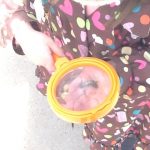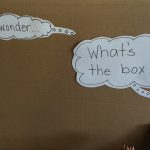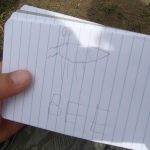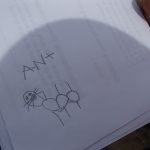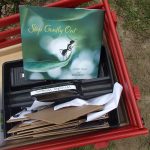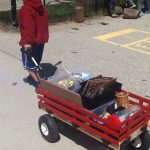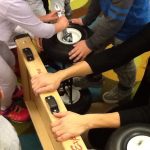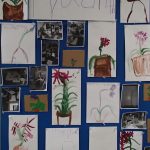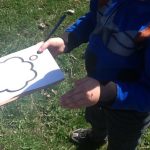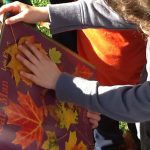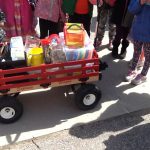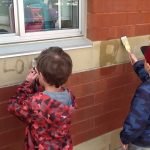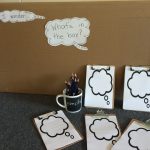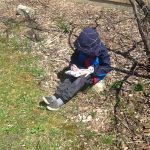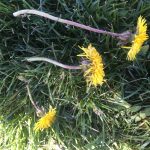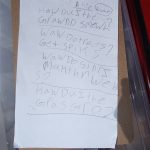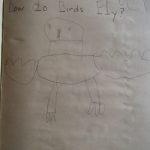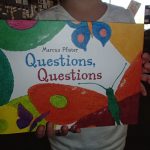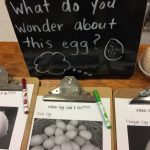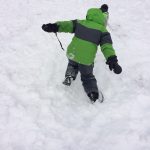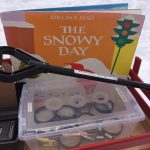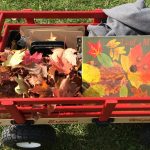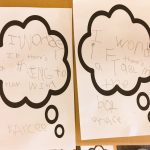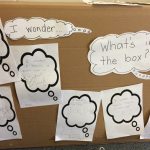Wonder Wagon: Inquiry Outdoor Learning with the Four Frames
If we create opportunities to “wonder” about the natural world, then kindergarten students will bring inquiry-based vocabulary and a sense of wonder to the four frames of the kindergarten curriculum.
Our goal was to create a ready-to-go outdoor classroom vehicle for the promotion of active exploration of the outdoors, using an all-season terrain wagon. This wagon contained materials to support inquiry with some materials and supplies which allowed spontaneous and planned lessons to occur outdoors. Learning was able to happen seamlessly in both environments. Our “Wonder Wagon” was a vehicle to carry our materials to aid in the flexibility of our newest “third teacher,” the outdoors, and the physical learning environment provided students with a means to capture their natural curiosity for discovering the world around them. Our plan was to take the outside in and the inside out.
Team Members
Cara McQueen
Wellington Catholic District School Board
Sue Norrish
Wellington Catholic District School Board
Professional Learning Goals
- Created a Wonder Wagon as a portable resource for outdoor learning for all seasons
- Connected our indoor and outdoor classrooms so children can easily transition from one to the other (and educators, too!)
- Developed outdoor learning opportunities for the kindergarten students using The Kindergarten Program 2016 Four Frames
- Became fluent in incorporating the four frames in a meaningful and authentic way
- Deepened our pedagogical documentation for practise
Activities and Resources
- Create a list of mentor texts to promote and support the use of the Wonder Wagon, as well as some suggested followup activities. Both were intended to readily ignite student thinking into authentic inquiry-based learning.
- Create a Wonder Wagon with a variety of materials (e.g., clipboards, pencils, magnifying glasses, string) and create seasonal bins for those specific seasonal items (e.g., specimen viewer for bugs collections in the fall/spring and mittens and shovels for the winter) that would make outside inquiries easily and readily available for both spontaneous and planned learning.
- Provide some outside learning provocations that allow students to explore by giving children the space, time and the open invitations to offer self-directed learning opportunities. For example, students created a musical fence with a variety of kitchen tools (cookie sheets, bowls, spoons, tongs, whisks, etc), an outside marble run along the fence as they wanted to re-create their own version of their indoor marble run (using foam pipe insulation pieces with zip ties), birdhouses (from scrap wood and purchased wood), and their own outdoor writing centre (with wide paintbrushes and water on the wall).
- Some topics: changes to our trees/plants, animals and habitats (monarch caterpillar to butterfly, worms, ants, animals storing food for winter), water and ice, how do we connect to our world?, how can we take care of our Earth?, what do you wonder about?, how can we make sounds and patterns outside?
Unexpected Challenges
All students were interested in participating in the Wonder Wagon explorations. We did find that there were times when it would be more beneficial to keep the groups smaller to accommodate individual wonderings and inquiry interests. We didn’t want to limit the participation, however, on some occasions, we offered small groupings to go out with an educator to explore and repeat with other groups as interested. Both whole class and small groupings were effective in outdoor learning with the Wonder Wagon.
Enhancing Student Learning and Development
The children understood that with the Wonder Wagon, our classroom of learning continued in the outdoors just as in our indoor classroom. Students were encouraged to explore and share their wonderings by talking to their peers and educators which enriched their oral language skills and allowed wonderful opportunities to introduce new vocabulary. Our kindergarten students were also involved in the documentation process as they easily shared their learning themselves by recording their ideas on paper or using the class camera and iPad for documenting. Opportunities to revisit the learning allowed for a deeper understanding and sharing of our documentation as our goal was to also move towards pedagogical documentation of student learning.
As educators, we were able to see all learning within the four frames. The outdoor classroom allows students to freely explore, question, create, build, problem-solve and connect their interests with one another and the outdoor world. We feel that it is especially vital to have more space for children to learn and grow. By using our outdoor classroom, we have provided a more enriched environment that supports a variety of learning styles for our young learners.
Sharing
We have created a google slideshow presentation to document our student learning and the Wonder Wagon concept so it can easily be shared with other educators. We feel that children have a natural curiosity and, as educators, we need to capitalize on this curiosity by supporting opportunities to explore our outdoor classroom and by guiding this play into purposeful learning. Through the presentation we hope to share the outdoor learning concept with fellow Kindergarten colleagues and those interested in inquiry based learning opportunities. In Wellington Catholic District School Board, we have already shared our learning at our staff meeting and with Kindergarten team colleagues. We hope to present at our school board Kindergarten PD day next year.
We also have thoroughly enjoyed the process of planning this project together and have appreciated the support of OTF to foster our own professional development. Through this experience we hope to encourage other teachers in the process of applying for their own Teacher Learning Co-op projects.
Project Evaluation
We felt our project was a success. Our goal was to use both indoor and outdoor classroom environments. We observed how the children understood the difference between outside learning time with the Wonder Wagon and their “recess” time.
We were able to measure our goals by our Assessment for learning and Assessment as Learning in various methods of collecting data
- Observations (anecdotal notes, audio recordings, photos, videos)
- Conversations and Documentation (conferencing with students, drawings and representations, samples of writing, creating story/learning panels, portfolios)
- Documenting the process of learning (pedagogical documentation shared with students and parents)
We believe the conversations have been rich due to the engagement of the activities. We were easily able to document evidence of learning within the Four Frames. We know we have met our goals by:
- Using the Wonder Wagon which generated authentic learning through student inquiry
- Students were actively engaged and would initiate the idea to access our Wagon
- The outdoor classroom seamlessly has become the third teacher
Resources Used
The Kindergarten Program, (2016)
http://www.edu.gov.on.ca/eng/curriculum/elementary/kindergarten.html
A Place for Wonder, Reading and Writing Non-Fiction in the Primary Grades by Georgia Heard and Jennifer McDonough, (2009)
Growing Success – The Kindergarten Addendum: Assessment, Evaluation, and Reporting in Ontario Schools, (2016)
http://www.edu.gov.on.ca/eng/policyfunding/growingsuccessaddendum.html
Questions, Questions by Marcus Pfister
The Listening Walk by Paul Showers
I Wonder by Annaka Harris and John Rowe
Outside Your Window: A First Book of Nature by Nicola Davies and Mark Hearld
A Rock Is Lively by Dianna Hutts Aston and Sylvia Long
I Wish You More by Amy Krouse Rosenthal and Tom Lichtenheld
A Nest Is Noisy by Dianna Hutts Aston
Step Gently Out by Helen Frost and Rick Lieder
If You Find a Rock by Peggy Christian
Leaf Man by Lois Elhert
If Rocks Can Sing by Leslie McGuirk
Resources Created
These resources will open in your browser in a new tab, or be downloaded to your computer.


